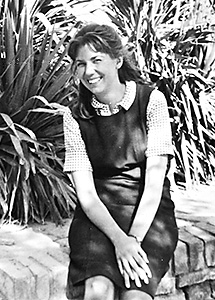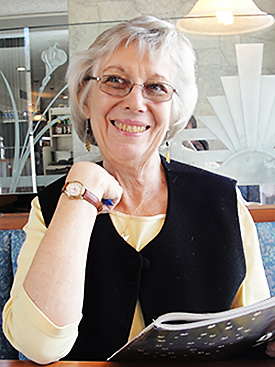WALLED IN, WALLED OUT published by Mary Dana Marks (Iran)
About Walled In, Walled Out —
A Young American Woman in Iran
by Mary Dana Marks (Iran 1964–66)
•
WHILE THE UNITED STATES leaps on and off a collision course with Iran, Americans forget we have not always been enemies.  This memoir is set in 1960s Iran, when the Shah reigns, American consultants abound, the word ayatollah is rarely heard, and SAVAK, Iran’s secret police, wields uncompromising power. In the west, Persia evokes images of colorful carpets, wealthy oil sheiks, and glamorous royalty. Leaders of the 1979 Iranian Revolution are in elementary school when Mary answers John F. Kennedy’s call to “ask what you can do for your country” and joins the Peace Corps.
This memoir is set in 1960s Iran, when the Shah reigns, American consultants abound, the word ayatollah is rarely heard, and SAVAK, Iran’s secret police, wields uncompromising power. In the west, Persia evokes images of colorful carpets, wealthy oil sheiks, and glamorous royalty. Leaders of the 1979 Iranian Revolution are in elementary school when Mary answers John F. Kennedy’s call to “ask what you can do for your country” and joins the Peace Corps.
The setting is Kerman, a conservative provincial capital on the stark Iranian plateau where she’s assigned to teach English to high school girls. Problems soon appear. As she struggles with the basics of everyday life, Iranians watch with amusement. Rather than the “harbinger of change” she expected to be, Mary has more to learn than any Kermani does.

Mary in Iran
Her role in the classrooms is nebulous. Perched on a folding chair in front of the students, she struggles to stay alert as her Iranian colleagues “explain” the English lesson in Farsi. Only at the end of class does Mary have a chance to lead them in spoken English. But she learns a lot of Persian sitting in those classrooms, and the students’ pronunciation improves. Socially, she’s a curiosity. She and her roommate are the only women who appear in public bareheaded. Chatting with a male colleague on the street causes an uproar. Walking through the bazaar, a turbaned Baluchi tribesman in front and a chanting Sufi dervish behind, Mary is the exotic one.
The intimate rhythms of Kermani life occur behind high walls, out of view. To her delight, Mary discovers that the formal, cautious behavior that women exhibit at school belies the easy camaraderie of their homes. Protected from the outside world by these imposing adobe barriers, their lives are full of family, friends, and familiarity. But Mary is often on the wrong side of the wall. When they sequester her, she longs to be outside, wandering freely through the bazaar or taking a casual stroll in the dusk of evening. When walls bar her view, she dreams of discovering what lies beyond. Walls, to her, are emblematic of the duality that suffuses Iran — the thick membrane between public and private personas.
Single and not yet twenty-two when she arrives in Kerman, Mary’s experiences stumbles, frustrations, small victories, romantic entanglements, and embarrassments share the pages of this book with extraordinary people: the feisty but proper Iranian man assigned to pave the way for Peace Corps Volunteers; a caring English teacher, whose frequent comment is, “Miss Mary, in Kerman we do NOT . . .;” a garage-owner and underground politician who “goes to meetings;” her pregnant friend, who extols the virtues of her arranged marriage, but avoids the eyes of a former boyfriend; and the home economics teacher, who demonstrates that if Mary eats that strange-tasting soup often enough, she’ll learn to love it. And she does.
Woven throughout this adventure are dusty travels from the Persian Gulf to the Caspian Sea, colorful feasts, rich history, and hidden romance. Walled In, Walled Out recounts Mary’s convoluted, often humorous journey from ignorance to understanding in this place that mixes mirage and harsh reality, a country where the people speak with many voices.
•
Mary Dana Marks, a West Virginia native, served as a Volunteer in Kerman, Iran from 1964 to 1966, and as a Returned Peace Corps Volunteer in a Summer, 1966, Austin, Texas training program. After earning a master’s degree in library science from the University of Michigan, she returned to Iran where she was librarian of the UNESCO-affiliated International Institute for Adult Literacy Methods in Tehran, and taught English as a second language. She and her family left Iran five years before its 1979 revolution.
 Mary spent most of her career as library director for the Museum of the American Indian in New York. While in this position, she edited the award-winning Native America in the Twentieth Century: An Encyclopedia. Determined to record her Peace Corps experiences, she started writing about Iran when she retired from the world of special libraries. A former member of Peace Corps Iran Association’s board of directors, she edited that organization’s newsletter, KhabarNameh for four years. Mary lives with her husband in New York City.
Mary spent most of her career as library director for the Museum of the American Indian in New York. While in this position, she edited the award-winning Native America in the Twentieth Century: An Encyclopedia. Determined to record her Peace Corps experiences, she started writing about Iran when she retired from the world of special libraries. A former member of Peace Corps Iran Association’s board of directors, she edited that organization’s newsletter, KhabarNameh for four years. Mary lives with her husband in New York City.
Walled In, Walled Out: A Young American Woman in Iran
by Mary Dana Marks (Iran 1964–66)
Peace Corps Writers
April 2017
348 pages
$16.00 (paperback), $5.49 (Kindle)
To order the books mentioned here from Amazon.com, click on the book cover, the bold book title, or the publishing format you would like, and Peace Corps Worldwide — an Amazon Associate — will receive a small remittance from your purchase that will help support the site and the annual Peace Corps Writers awards.
I laughed and I cried reading Mary’s story because it was my story too. I was a TEFL teacher in Shiraz (Iran VI) from 1965-1967 and had many of Mary’s experiences as a single woman in Iran. I too struggled with classroom instruction and summer camps with crafts and games and my worry that I wasn’t making a difference in these young girls lives.
My travels also took me to sweltering Bandar Abbas where I too bought a metallic face mask like the women there wear, and a vacation to Istanbul gave me a perspective on East and West that carried me through my last year in Iran. Like Mary I fell in love with a volunteer with a fiancé back home, and had my share of marriage proposals from Iranian men. Alice Phinney was in my TEFL group that trained in Austin, Texas, and was a remarkable example of a determined woman who feared nothing. I’m so glad to know she shared the Kerman experience with you.
Mary’s story captured the many emotions that only another young American woman in Iran would understand. I was fortunate to have a strong support group of Peace Corps volunteers, USAID families, and the Iranian teachers who welcomed me into their homes and their lives. My two years in Iran were life-changing; my view of the world was forever changed, and I became a better person as a result.
Thank you, Mary, for writing my story for me—you’ve given me a priceless gift!